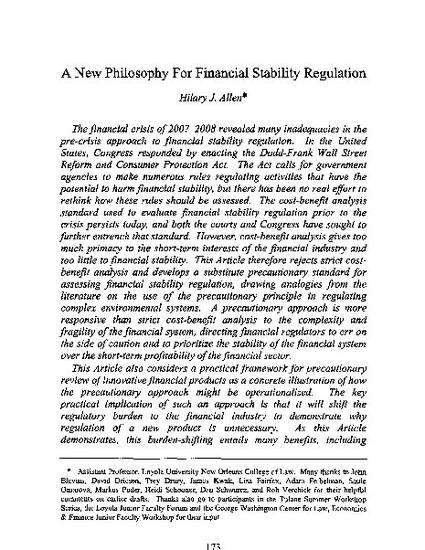
Article
A New Philosophy for Financial Stability Regulation
Loyola University Chicago Law Journal
(2013)
Abstract
The financial crisis of 2007-2008 revealed many inadequacies in the pre-crisis approach to financial stability regulation. In the United States, Congress responded by enacting the Dodd-Frank Wall Street Reform and Consumer Protection Act. The Act calls for government agencies to make numerous rules regulating activities that have the potential to harm financial stability, but there has been no real effort to rethink how these rules should be assessed. The cost-benefit analysis standard used to evaluate financial stability regulation prior to the crisis persists today, and both the courts and Congress have sought to further entrench that standard. However, cost-benefit analysis gives too much primacy to the short-term interests of the financial industry and too little to financial stability. This Article therefore rejects strict cost- benefit analysis and develops a substitute precautionary standard for assessing financial stability regulation, drawing analogies from the literature on the use of the precautionary principle in regulating complex environmental systems. A precautionary approach is more responsive than strict cost-benefit analysis to the complexity and fragility of the financial system, directing financial regulators to err on the side of caution and to prioritize the stability of the financial system over the short-term profitability of the financial sector.
Keywords
- financial stability,
- cost-benefit analysis,
- financial industry,
- precautionary standard,
- financial system
Disciplines
Publication Date
February 21, 2013
DOI
http://dx.doi.org/10.2139/ssrn.2085336
Citation Information
Hilary J Allen. "A New Philosophy for Financial Stability Regulation" Loyola University Chicago Law Journal Vol. 45 (2013) p. 173 - 231 ISSN: 0024-7081 Available at: http://works.bepress.com/hilary-allen/3/
